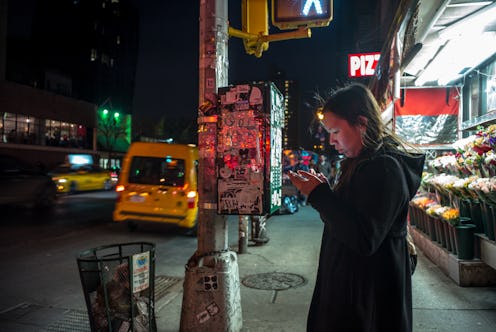News
This App Wants To Walk You Home Safely

As a woman, walking alone at night can be one of life's most stressful situations — even though it shouldn't be. We shouldn't have to find ourselves constantly checking over our shoulder when we're on our way home after a night out or embarking on a midnight snack run; our safety should just be a given. But while we still live in a world where that isn't the case, we can still take measures to set our minds at ease. To wit, thousands of women are now using Companion, an app designed to keep you safe when you're walking alone.
Companion, created by five students at the University of Michigan, virtually walks you home at night, ensuring your safety until you've reached your destination. According to a post on the app's blog, the creators were inspired to design Companion after receiving numerous crime alert emails from campus safety. They write:
On a college campus, walking is almost always the transportation method of choice. Most people don’t have cars, cabs can get expensive, SAFE rides are inconvenient, and the bus is either hit or miss. Besides, on most campuses things are pretty tightly packed. In Ann Arbor, nothing is usually ever further than a 15 minute walk away. After a long night of studying at the library, hanging out at a friends house, or leaving a party early, walking home is often the most practical option. Yet with rampant crime alerts, increasing sexual assaults and other violence issues, few actually feel safe when doing so.
That's where Companion comes in. After you set it running, it tracks you in real time, allowing you to easily and quickly reach out for help should you need it — and when time is of the essence, "quickly" is key.
It's frustrating to think we live in a world where simply getting from one place to another can turn into a life-threatening situation. The need to be so safety-conscious and constantly aware of your surroundings can be an incredibly inhibiting feeling — and unfortunately, it's the present reality for most women (along with many other people as well). But although it shouldn't be anyone's responsibility to make sure someone doesn't assault them — people just need to not assault other people in the first place — we can still try to take control of the situation via apps like Companion.
Companion makes protecting yourself and your friends that much easier with some seriously awesome and unique features. Here's how it works:
1. Pair You With A Friend
Companion starts by pairing you up with a friend. Simply select a name from your contacts, and Companion will send them updates about your journey via SMS. You can select more than one friend, and they don't even need to have the app installed in order to be there for you.
2. Detect Changes In Your Route
If at any time on your walk you divert off-course, start running, fall, or have your headphones pulled out, Companion will give you 15 seconds to check in and ensure that you're okay. If you don't check in within those 15 seconds, your phone will begin blaring alarm sounds, and you'll be prompted instantly to call the police. Your friend will also receive an emergency notification and emergency number to call.
3. Keep Emergency Contacts Handy
The main screen of Companion always has police and public safety information ready to go. There is even a button just to say "I Feel Nervous" that brings local authorities' attention to that particular location.
4. Stay Safe While Driving
Even if you don't live in a city where walking is the main mode of getting around, Companion can still work for you. There is a driving mode that allows you to plan a route and stay in touch with a friend along the way.
5. Anyone Can Use It
Though Companion was originally designed by college students for college students, that certainly doesn't limit its uses to on-campus. People of all ages and genders have reported using the app for themselves, their children, or elderly parents. It's also a great tool for people traveling and navigating unfamiliar cities.
Companion is free and available for both iOS and Android.
Images: Susan Sermoneta/Flickr; Companion (3)